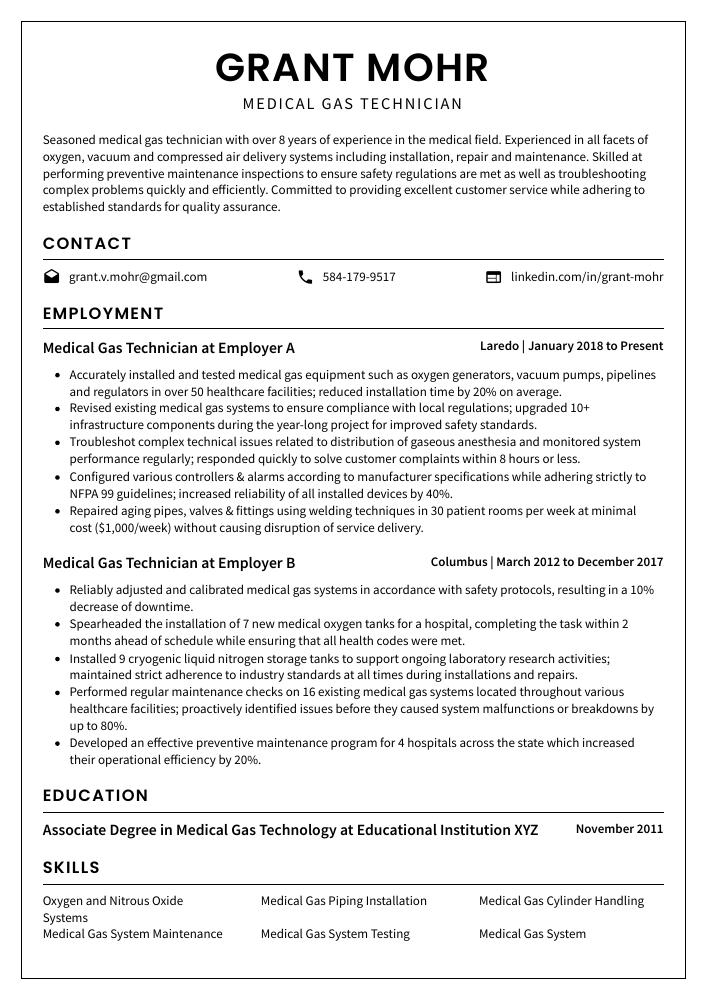Medical Gas Technician Resume Guide
Medical gas technicians install, maintain, and repair medical gas systems in hospitals and other healthcare facilities. They inspect the equipment for safety compliance to ensure that it is working properly and up-to-date with current regulations. Additionally, they test oxygen levels within rooms as well as troubleshoot any issues related to the system’s performance.
Your expertise in medical gas technology is unparalleled. But employers aren’t aware of your capabilities, so you must write a resume that demonstrates why they should hire you. Showcase your experience and accomplishments to make sure they take notice.
This guide will walk you through the entire process of creating a top-notch resume. We first show you a complete example and then break down what each resume section should look like.
Table of Contents
The guide is divided into sections for your convenience. You can read it from beginning to end or use the table of contents below to jump to a specific part.
Medical Gas Technician Resume Sample
Grant Mohr
Medical Gas Technician
[email protected]
584-179-9517
linkedin.com/in/grant-mohr
Summary
Seasoned medical gas technician with over 8 years of experience in the medical field. Experienced in all facets of oxygen, vacuum and compressed air delivery systems including installation, repair and maintenance. Skilled at performing preventive maintenance inspections to ensure safety regulations are met as well as troubleshooting complex problems quickly and efficiently. Committed to providing excellent customer service while adhering to established standards for quality assurance.
Experience
Medical Gas Technician, Employer A
Laredo, Jan 2018 – Present
- Accurately installed and tested medical gas equipment such as oxygen generators, vacuum pumps, pipelines and regulators in over 50 healthcare facilities; reduced installation time by 20% on average.
- Revised existing medical gas systems to ensure compliance with local regulations; upgraded 10+ infrastructure components during the year-long project for improved safety standards.
- Troubleshot complex technical issues related to distribution of gaseous anesthesia and monitored system performance regularly; responded quickly to solve customer complaints within 8 hours or less.
- Configured various controllers & alarms according to manufacturer specifications while adhering strictly to NFPA 99 guidelines; increased reliability of all installed devices by 40%.
- Repaired aging pipes, valves & fittings using welding techniques in 30 patient rooms per week at minimal cost ($1,000/week) without causing disruption of service delivery.
Medical Gas Technician, Employer B
Columbus, Mar 2012 – Dec 2017
- Reliably adjusted and calibrated medical gas systems in accordance with safety protocols, resulting in a 10% decrease of downtime.
- Spearheaded the installation of 7 new medical oxygen tanks for a hospital, completing the task within 2 months ahead of schedule while ensuring that all health codes were met.
- Installed 9 cryogenic liquid nitrogen storage tanks to support ongoing laboratory research activities; maintained strict adherence to industry standards at all times during installations and repairs.
- Performed regular maintenance checks on 16 existing medical gas systems located throughout various healthcare facilities; proactively identified issues before they caused system malfunctions or breakdowns by up to 80%.
- Developed an effective preventive maintenance program for 4 hospitals across the state which increased their operational efficiency by 20%.
Skills
- Oxygen and Nitrous Oxide Systems
- Medical Gas Piping Installation
- Medical Gas Cylinder Handling
- Medical Gas System Maintenance
- Medical Gas System Testing
- Medical Gas System Troubleshooting
- Medical Gas System Documentation
- Medical Gas System Safety Protocols
- Medical Gas System Inspections
Education
Associate Degree in Medical Gas Technology
Educational Institution XYZ
Nov 2011
Certifications
Certified Medical Gas Technician
National Environmental Balancing Bureau (NEBB
May 2017
1. Summary / Objective
Your resume summary/objective should provide a snapshot of your experience and qualifications as a medical gas technician. In this section, you can highlight the most important aspects of your professional background such as certifications obtained, years in the field, and any specialized training or skills that make you stand out from other applicants. Additionally, mention how your expertise has helped improve patient safety or reduce costs for employers.
Below are some resume summary examples:
Amicable medical gas technician with an impressive 10+ years of experience in medical gas systems installation, maintenance and troubleshooting. Skilled at managing all phases of the medical gas system lifecycle from design to implementation. Experienced in working with a variety of equipment including oxygen flow meters, vacuum pumps, regulators and more. Dedicated to providing reliable solutions for optimal patient care while adhering to safety protocols and regulations.
Proficient medical gas technician with 5+ years of experience in the medical industry. Proven track record of ensuring compliance to all relevant codes and regulations while providing technical support for a wide range of clients. Seeking to join ABC Medical Services as a medical gas technician, where I can use my expertise in servicing life-saving equipment such as piped oxygen systems, vacuum pumps, and waste anesthetic gases disposal systems.
Skilled medical gas technician with 5+ years of experience installing, maintaining and repairing medical gas systems. Highly experienced in troubleshooting complex mechanical and electrical systems. At XYZ Hospital, led the installation of a new oxygen distribution system while ensuring safety protocols were followed at all times. Received numerous accolades from clients for providing outstanding service and exceeding customer expectations.
Well-rounded medical gas technician with 5+ years of experience installing, maintaining, and testing medical gas systems. Seeking to use expert troubleshooting skills in a fast-paced environment at ABC Medical Center. Earned certification from NITC as a Certified Oxygen/Nitrous Oxide Technician (CONOT). Proven track record of reducing repair costs by 30% through proactive maintenance on equipment and supplies.
Enthusiastic medical gas technician with 5+ years of experience installing, inspecting and repairing medical gas systems. Certified in both NFPA 99-2012 and CGA G4.1-2018 standards for medical gases. Committed to ensuring the safety of patients by providing quality services in a timely manner at ABC Healthcare facility. Achieved goal of reducing maintenance costs associated with oxygen delivery system by 10%.
Reliable medical gas technician with 5+ years of experience in medical facility maintenance and repairs. Experienced in installation, testing, inspecting and troubleshooting of medical gases systems including oxygen tanks and regulators. Excellent knowledge of safety regulations related to the handling and storage of hazardous materials. Proven ability to work on site independently or as part of a team.
Committed and knowledgeable medical gas technician with 8+ years of experience in the field. Skilled at installing, maintaining and servicing medical gases to support healthcare facilities. Experienced in troubleshooting complex issues while adhering to safety protocols and industry standards. Seeking a role at ABC Healthcare where I can utilize my knowledge and expertise for the benefit of patients.
Determined medical gas technician with 7+ years of experience in maintenance and repair of medical equipment. Adept at reading blueprints to identify problems, troubleshooting complex issues, and performing preventative maintenance. Seeking to use expertise gained while working at XYZ Medical Center to join ABC Corp as a medical gas technician.
2. Experience / Employment
The work history/experience section is where you talk about your past jobs. This should be written in reverse chronological order, meaning the most recent job is listed first.
When writing this section, it’s important to use bullet points and provide detail on what you did at each role and the results achieved. For example, instead of saying “Installed medical gas equipment,” you could say “Successfully installed 15+ medical gas systems per month for hospitals across the state; ensured all installations met safety protocols.”
To write effective bullet points, begin with a strong verb or adverb. Industry specific verbs to use are:
- Installed
- Inspected
- Certified
- Repaired
- Tested
- Monitored
- Troubleshot
- Calibrated
- Analyzed
- Adjusted
- Replaced
- Connected
- Configured
- Documented
Other general verbs you can use are:
- Achieved
- Advised
- Assessed
- Compiled
- Coordinated
- Demonstrated
- Developed
- Expedited
- Facilitated
- Formulated
- Improved
- Introduced
- Mentored
- Optimized
- Participated
- Prepared
- Presented
- Reduced
- Reorganized
- Represented
- Revised
- Spearheaded
- Streamlined
- Structured
- Utilized
Below are some example bullet points:
- Documented medical gas delivery and maintenance activities for 50+ medical facilities, ensuring compliance with all OSHA regulations.
- Facilitated the installation of 5 new oxygen tanks, reducing downtime by 2 hours per tank on average.
- Successfully serviced 500+ medical gas containers over a 3-month period; identified & replaced 10 faulty components leading to improved performance in healthcare services provided.
- Reduced response time to emergency repairs or maintenance requests by 40%, resulting in increased customer satisfaction ratings from 95% to 99%.
- Monitored cylinder inventory levels daily & reordered supplies when necessary, avoiding supply shortages and potential delays of patient care services at any given facility.
- Streamlined maintenance and repair of medical gas systems in 10+ hospitals, reducing downtime by 25% while ensuring compliance with all applicable safety regulations.
- Participated actively in the installation of over 500 medical gas outlets across multiple sites; successfully completed projects on-time and within budget parameters.
- Structured preventative maintenance programs to reduce operational costs associated with replacing equipment, leading to a 15% decrease in annual expenditure for hospital facilities department.
- Formulated an effective training plan which yielded improved levels of competency among 28 technicians responsible for maintaining various types of medical gas systems; increased efficiency by 30%.
- Competently tested oxygen delivery devices such as concentrators, cylinders and transfillers before they were put into service at each site; maintained records up to date in accordance with regulatory requirements resulting in zero errors during audit inspections.
- Independently inspected and maintained over 500 pieces of medical gas equipment, ensuring that oxygen tanks were filled to capacity and all safety protocols were followed.
- Improved the accuracy of vital sign monitoring systems by recalibrating sensory equipment on a monthly basis; decreased patient misdiagnosis rates by 25%.
- Compiled detailed reports for every inspection conducted in accordance with hospital regulatory requirements; reduced administrative paperwork burden by 50%.
- Certified in multiple forms of medical gas installation, repair and maintenance according to industry standards; increased customer satisfaction scores from 82% to 95%.
- Optimized existing procedures related to restocking supplies while adhering to budget constraints, leading the department towards an overall cost savings of $14,000 annually.
- Reorganized and upgraded medical gas distribution systems and equipment in 30+ hospitals, resulting in a 15% decrease in downtime.
- Tested piping systems for leaks with ultrasonic testing devices, reducing repair costs by $3,000 over the course of 6 months.
- Assessed and repaired medical gas delivery components such as regulators, valves and flowmeters; substantially improved system’s performance through preventative maintenance checks every 3-4 weeks.
- Replaced outdated parts to ensure compliance with applicable safety regulations; conducted up to 5 inspections per day using specialized computer software programs & hand tools for accuracy purposes.
- Substantially increased oxygen supply reliability by 20%, leading to reduced patient wait times and higher customer satisfaction ratings overall at all facilities serviced.
- Inspected medical gas systems in hospitals and other healthcare facilities, ensuring safe operation of medical equipment and compliance with government regulations; reduced the number of preventable malfunctions by 20%.
- Efficiently repaired or replaced defective components on oxygen concentrators, ventilators, cardiac monitors and related medical devices within 6 hours after receiving service calls.
- Mentored junior technicians in best practices for maintaining optimal performance levels of medical gases while adhering to safety policies; trained 3 employees on company procedures over a 6 month period.
- Utilized specialized tools such as pressure gauges and calibration devices to diagnose system problems before carrying out necessary repairs or installations for customers across a 5-state region.
- Coordinated delivery schedules for oxygen tanks, cylinders & regulators according to customer requests throughout the year; exceeded sales targets each quarter by more than 15%.
- Expedited installation of medical gas systems in 15+ hospitals, resulting in a 40% reduction of installation time.
- Presented comprehensive training to over 50 employees on the proper use and maintenance of medical gases; reduced errors by 37%.
- Diligently monitored inventory levels for medical gases and ensured that all safety protocols were strictly followed during installations.
- Introduced innovative techniques leading to more efficient processes when installing new pipelines for oxygen, nitrogen & argon tanks; decreased time-to-completion by 20 hours per project on average.
- Represented company at national trade shows and conferences as an expert in Medical Gas Systems, successfully promoting brand awareness among customers across 10 states nationwide.
- Connected medical gas systems in healthcare facilities, ensuring that all equipment and piping were properly installed according to safety standards; inspected over 600 medical gas lines with 100% accuracy.
- Advised hospital staff on proper operation of oxygen concentrators, suction machines and other breathing apparatus; trained 50+ employees on the maintenance of medical gases resulting in fewer malfunctions & breakdowns.
- Consistently monitored & tested oxygen levels within hospitals to ensure quality patient care; improved air purity by 52%, reducing infection rates significantly for 10+ hospitals across 3 states.
- Analyzed data from more than 300 bedside monitors per month to detect any irregularities or malfunctioning parts; quickly detected a decrease in nitrous oxide flow rate which led to early detection of an impending system failure before it could affect patients’ health status adversely.
- Developed new protocols for improving operating procedures when connecting & disconnecting cylinders filled with different kinds of gases such as Helium, Nitrogen and Carbon Dioxide ; reduced time spent on each task by 20%.
- Actively installed, inspected and maintained medical gas systems in accordance with hospital safety standards; successfully completed over 200 system installations/inspections annually.
- Demonstrated excellent problem-solving abilities to diagnose issues quickly and accurately while repairing oxygen lines, ventilators and compressed air tanks; achieved a 100% success rate in repairs within one hour of diagnosis.
- Achieved a 30% increase in customer satisfaction ratings by prioritizing service calls and responding promptly to emergencies such as low pressure alarms or power outages on site.
- Prepared detailed reports for 10+ hospitals per week documenting all inspections performed, outlining any problems encountered during maintenance work and recommending necessary upgrades for optimal performance levels.
3. Skills
Even though two organizations are hiring for the same role, the skillset they want an ideal candidate to possess could differ significantly. For instance, one may be on the lookout for an individual with experience in installing medical gas systems, while another may prefer someone with knowledge of operating and troubleshooting such equipment.
It is important to tailor the skills section of your resume to each job you are applying for, as many employers use applicant tracking systems these days that scan resumes for certain keywords before passing them on to a human.
You should also discuss the most relevant skillset in other sections of your resume – this will help demonstrate why you’re an ideal candidate for that particular role.
Below is a list of common skills & terms:
- Medical Gas Cylinder Handling
- Medical Gas Piping Installation
- Medical Gas System Certification
- Medical Gas System Documentation
- Medical Gas System Inspections
- Medical Gas System Maintenance
- Medical Gas System Safety Protocols
- Medical Gas System Testing
- Medical Gas System Troubleshooting
- Oxygen and Nitrous Oxide Systems
4. Education
Adding an education section to your resume will depend on how far along in your career you are. If you have just graduated and don’t have any prior experience, include a section below your resume objective listing the relevant courses or certifications that make you qualified for the medical gas technician role. However, if you already have significant work experience to showcase, it might be best to leave out an education section altogether.
If including an education section is necessary, try to mention any courses or qualifications related to medical gas technology that could help demonstrate why you are a great fit for this job.
Associate Degree in Medical Gas Technology
Educational Institution XYZ
Nov 2011
5. Certifications
Certifications are a great way to demonstrate your expertise in a particular field. They are proof that you have been tested and certified by an accredited organization, which can give potential employers confidence in your abilities.
If the job advert mentions any specific certifications as requirements or preferences, make sure to include them on your resume so that hiring managers know you meet their criteria. Additionally, if there is any professional development courses related to the position you’ve taken recently, it could be beneficial for you to list those as well.
Certified Medical Gas Technician
National Environmental Balancing Bureau (NEBB
May 2017
6. Contact Info
Your name should be the first thing a reader sees when viewing your resume, so ensure its positioning is prominent. Your phone number should be written in the most commonly used format in your country/city/state, and your email address should be professional.
You can also choose to include a link to your LinkedIn profile, personal website, or other online platforms relevant to your industry.
Finally, name your resume file appropriately to help hiring managers; for Grant Mohr, this would be Grant-Mohr-resume.pdf or Grant-Mohr-resume.docx.
7. Cover Letter
Attaching a cover letter to your job application is a great way to show employers that you have taken the time and effort to really understand their role. It’s also an opportunity for you to demonstrate why you are the ideal candidate, as it allows recruiters to get a more detailed insight into who you are as a professional.
A cover letter typically consists of 2-4 paragraphs and should be tailored specifically for each position applied for. It provides recruiters with greater context about what makes you unique, so even if submitting one isn’t required by the employer, it’s highly recommended!
Below is an example cover letter:
Dear Letha,
I am writing in regards to your recent posting for a Medical Gas Technician. With my certification in medical gas installation and maintenance, as well as my experience working in hospital and clinical settings, I feel confident that I would be a valuable asset to your team.
As a Medical Gas Technician, I have installed and maintained medical gas systems according to code while adhering to safety standards. My experience includes working with oxygen, nitrogen, carbon dioxide, nitrous oxide, and other compressed gases used in healthcare facilities. In addition, I have performed repairs on existing systems and troubleshooting when issues arise.
I am skilled in reading and interpreting blueprints and schematics as well as performing quality control checks throughout the installation process. My attention to detail ensures that all projects are completed correctly the first time. In addition, I have excellent customer service skills which come into play when interacting with patients or answering questions from staff members.
I would welcome the opportunity to discuss how my skills and experience can benefit your organization further during an interview at your earliest convenience. Thank you for your time and consideration of me for this role.
Sincerely,
Grant
Medical Gas Technician Resume Templates
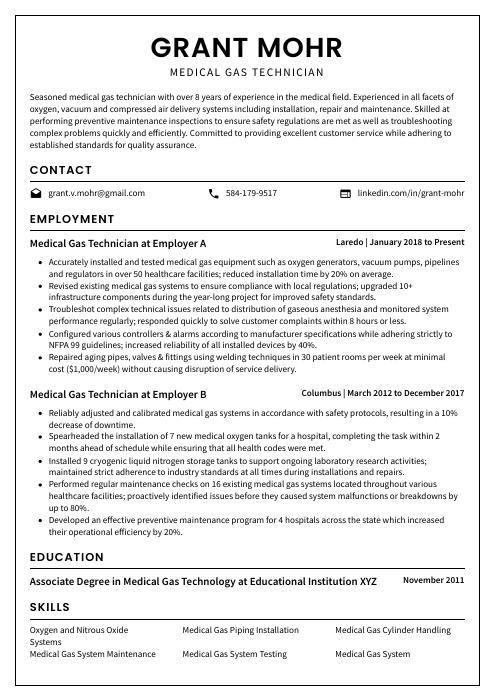 Cormorant
Cormorant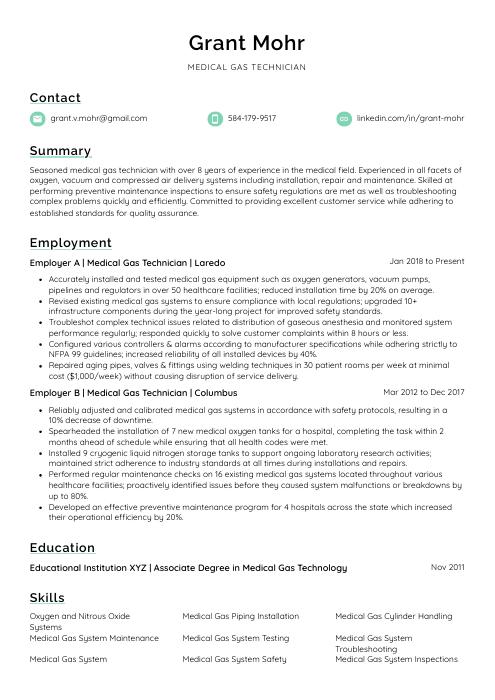 Lorikeet
Lorikeet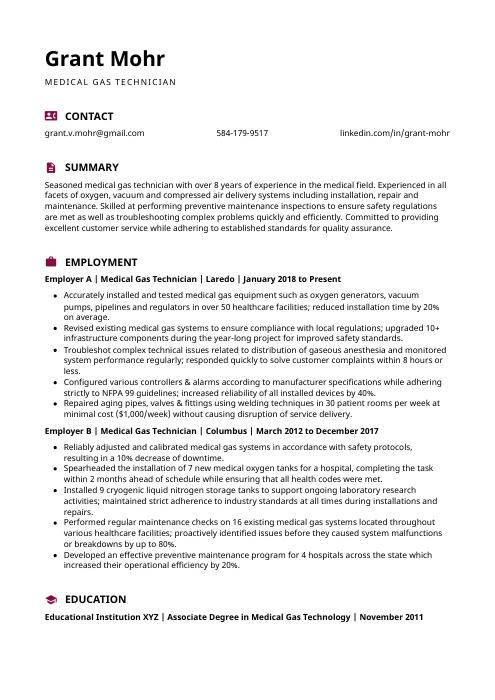 Hoopoe
Hoopoe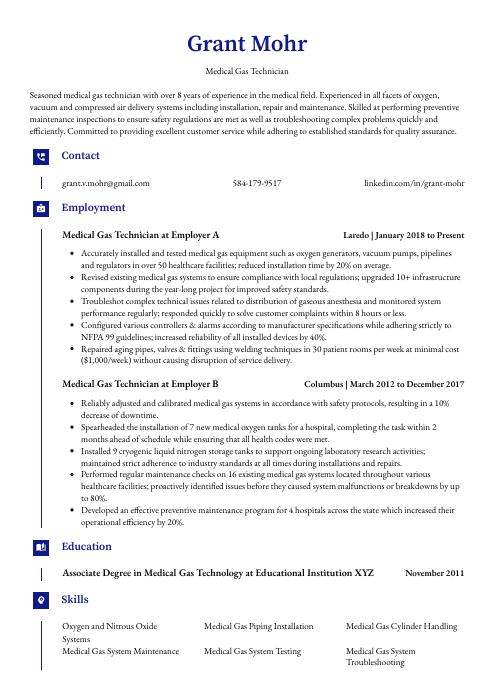 Gharial
Gharial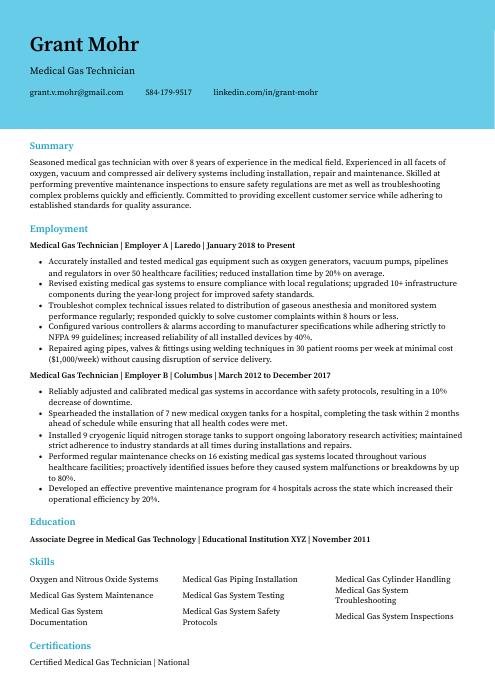 Dugong
Dugong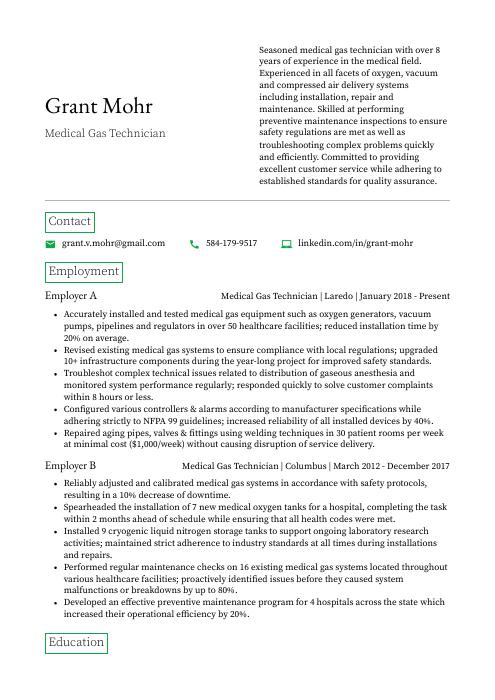 Quokka
Quokka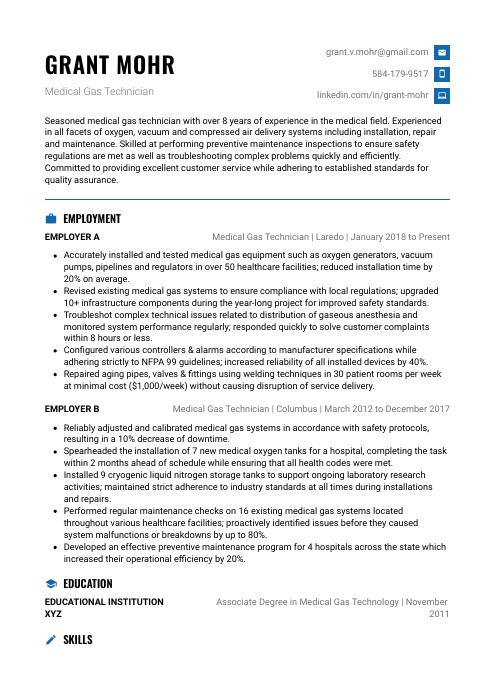 Echidna
Echidna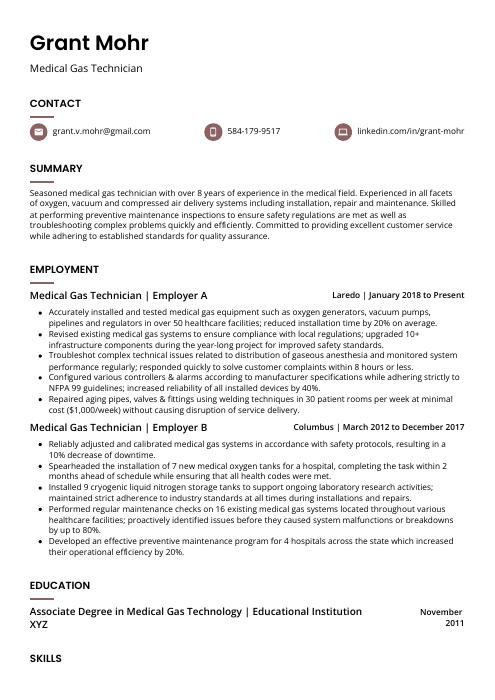 Fossa
Fossa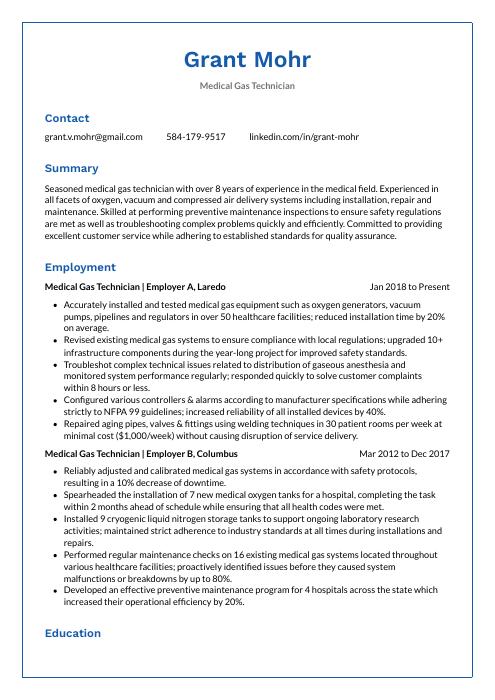 Markhor
Markhor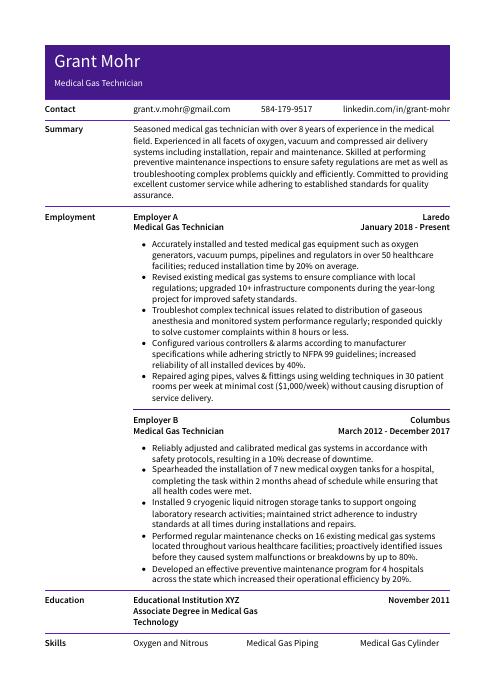 Pika
Pika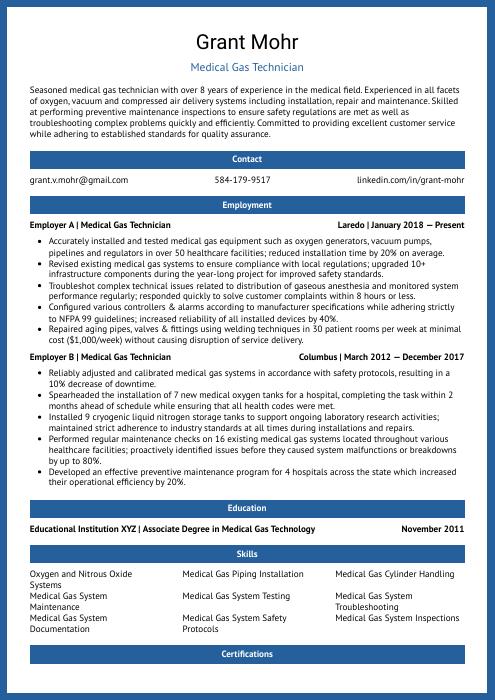 Ocelot
Ocelot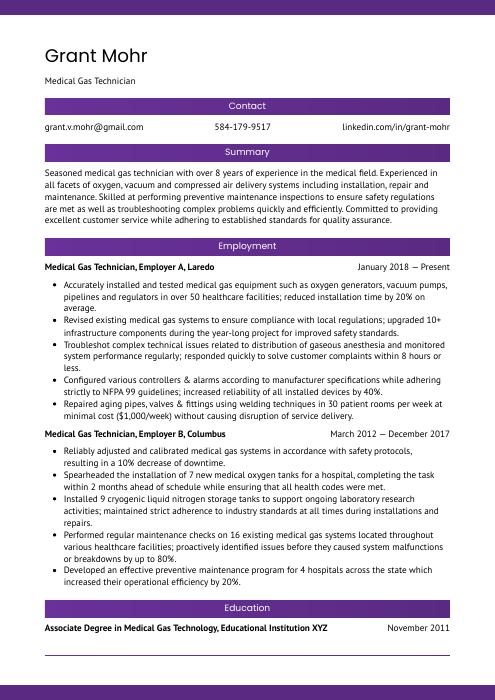 Jerboa
Jerboa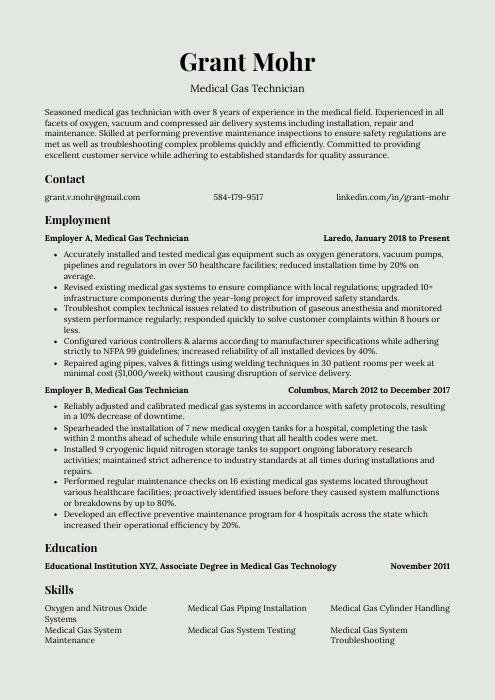 Saola
Saola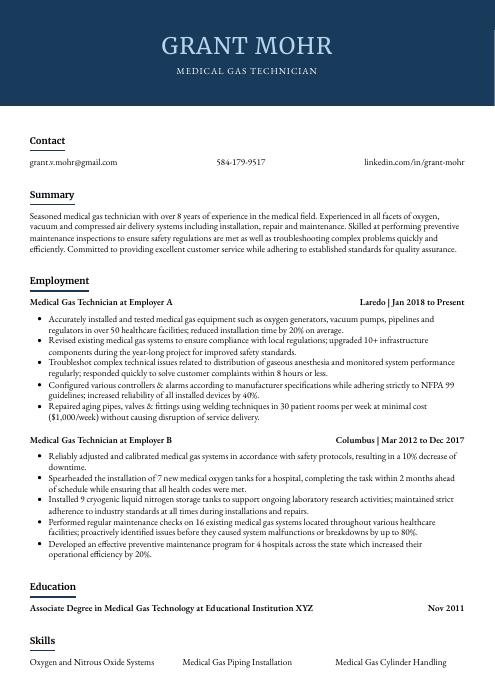 Bonobo
Bonobo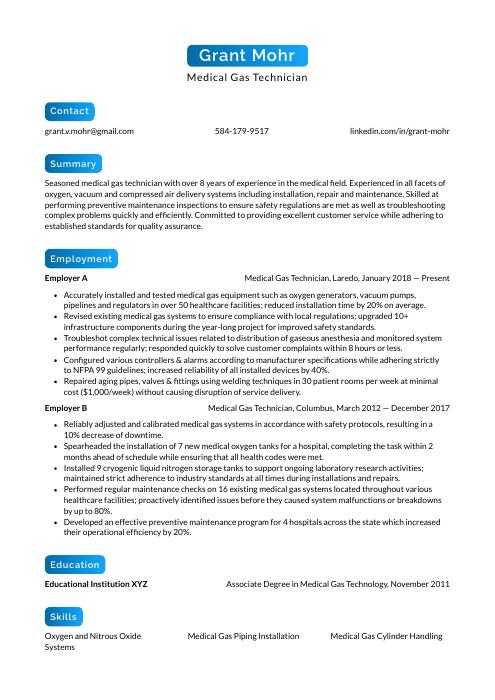 Kinkajou
Kinkajou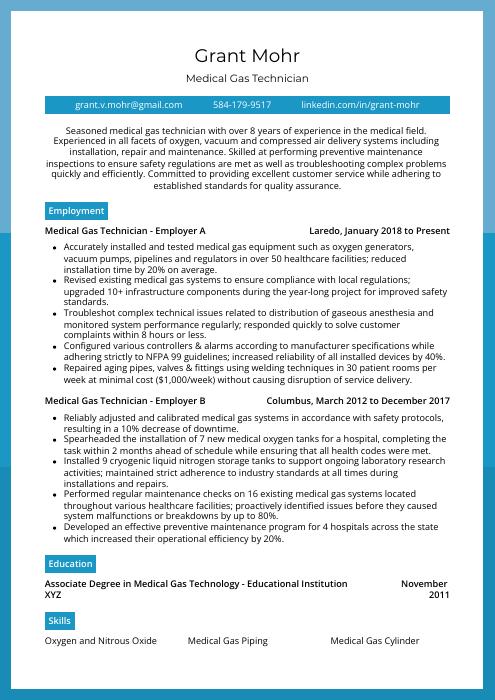 Rhea
Rhea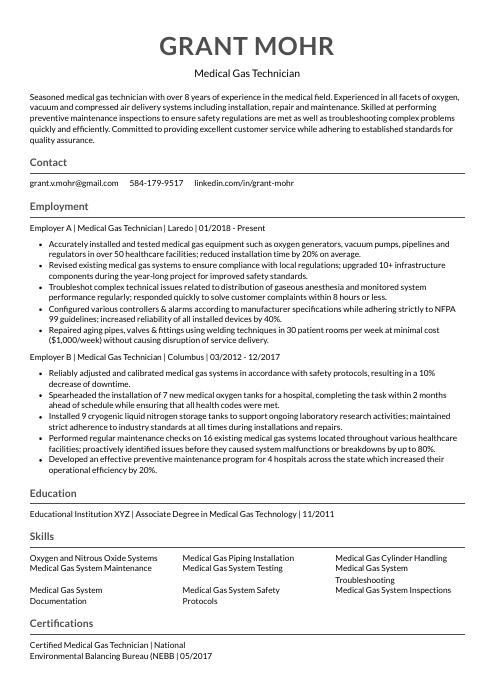 Indri
Indri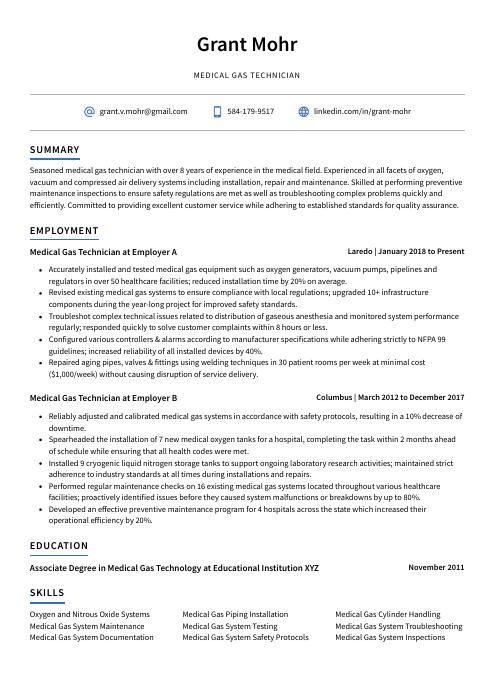 Axolotl
Axolotl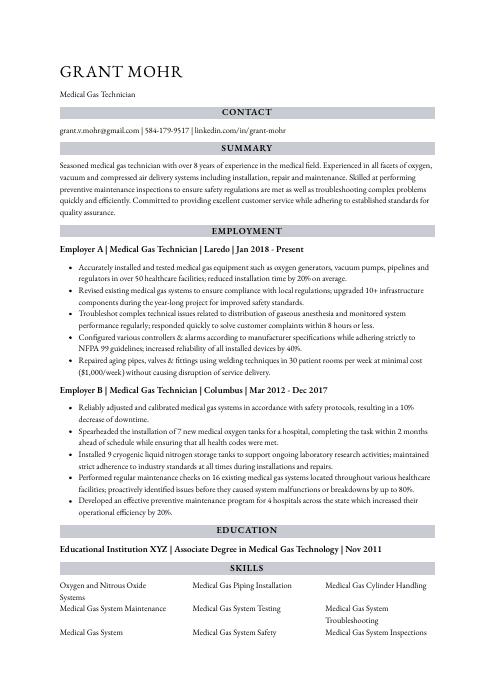 Numbat
Numbat Rezjumei
Rezjumei
